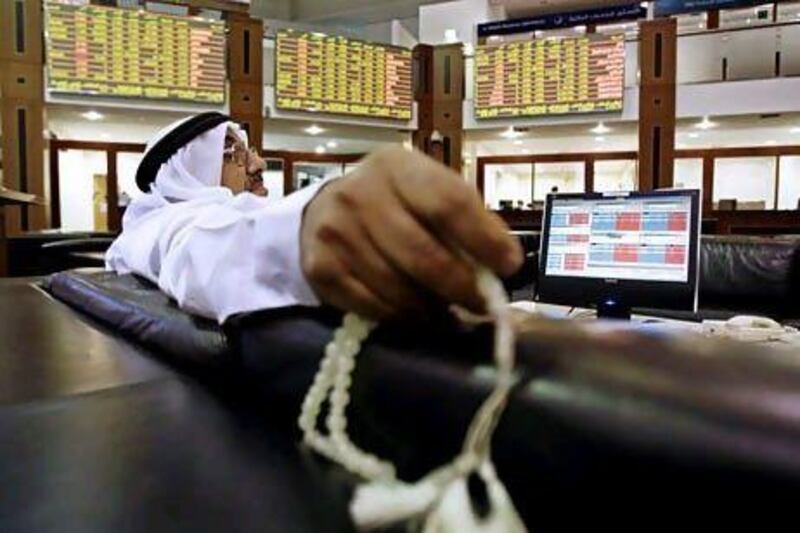Stock markets across the Middle East extended their losses yesterday as Saudi Arabia led declines and Dubai hit a seven-year low.
Saudi Arabia's Tadawul, the Arab world's largest and most liquid stock market, fell to its lowest level in almost two years yesterday. In the 13th straight day of losses, the Tadawul closed down 3.8 per cent to 5,323.27.
Its All-Share Index suffered its biggest one-day decline since November 2008 on Tuesday, and has retreated more than 20.5 per cent since protests in Egypt erupted in January. The cost of insuring government debt in Saudi Arabia, which was the least expensive in the region before the crisis, now exceeds Abu Dhabi and Qatar for the first time since 2009. The cost of insuring government debt across the Mena region has soared as popular uprisings toppled leaders in Tunisia and Egypt.
Investors are shunning Mena region assets as protests spread and the outlook is uncertain. The Dubai Financial Market extended losses from earlier in the week, as it slipped 3.48 per cent to 1,374.43 points. Qatar's measure dropped to a five-month low, retreating 3.6 per cent, and Kuwait ended at its lowest point since 2004.
"The hot money that was coming in is now finding a way out," said Ghanem Nuseibeh, a political and economic risk analyst and the co-founder and director of the management consultancy Cornerstone Global Associates.
"Regional investors will get out of places that are perceived as more risky and that, of course, has an implication [on stock markets]," he said. The GCC countries that have experienced unrest, Oman and Bahrain, were also in the red yesterday. The Muscat measure slipped 1.5 per cent to 6,303.82 and Bahrain's index closed just over 1 per cent down at 1,409.79.
Mohammed Ali Yasin, the chief investment officer at CAPM Investment, said investors were "very tense and edgy".
Concerns over the unrest in the region, which is home to two-thirds of the world's oil reserves, has also affected the price of oil.
Oil has been trading at 30-month highs and Brent crude edged higher yesterday, rising above US$116.
Jim Rogers, a billionaire US investor, said he was "extremely comfortable" about investing in countries that had large oil reserves, but was concerned about the weakness of the dollar.
"Who's got the oil? Abu Dhabi has got the oil," said Mr Rogers at a financial markets gathering in Abu Dhabi yesterday.
Nassim Nicholas Taleb, an economics writer and the author of The Black Swan, shared Mr Rogers' concerns about the US economy, saying the largest risk to growth was the size of the US government deficit, not an oil shock.
Saif al Islam Qaddafi, the son of the Libyan leader, said last week protesters who had overrun large swathes of the country might burn Libya's oilfields.
Mr Taleb said this was unlikely. "I'm not that worried about the economic impact. It's not like they're going to burn the oil, they're going to sell it," he said.
[ ghunter@thenational.ae ]






